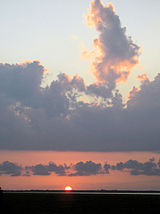Guadalquivir Marshes
Appearance
Guadalquivir Marshes
Marismas del Guadalquivir | |
|---|---|
Andalucia | |
| Area | |
• Total | 2,000 km2 (800 sq mi) |

The Guadalquivir Marshes (in
Guadalquivir River
.
The Las Marismas zone forms a large part of the
Andalucia, Spain. The area includes parts of the municipalities of Isla Mayor, Los Palacios y Villafranca, La Puebla del Río, Utrera, Las Cabezas de San Juan and Lebrija
.
Rice farming in this area produces 40% of Spain's national crop. Some areas are protected for wildlife and habitat, including dunes.
History
Approximately two
Lacus Ligustinus in Latin, leading to the Guadalquivir River mouth with some sand bars to the South. Over time the lake silted up, gradually transforming into marshland.[1] This silt has formed into a barrier of dunes extending approximately 70 kilometres (43 mi) along the coast, known as Arenas Gordas (English: "the fat sands").[2]
The
Alejandro María Aguado y Ramírez de Estenoz.[3]
In the early 21st century, the Guadalquivir wetland region's main economic activity is
rice farming
. It has an annual output of about 310,000 metric tonnes, equating to approximately 40% of Spain's rice production.
Protected area
The wetland zone acts as a
Spanish Government to purchase a substantial part of the local wetlands in order to preserve them.[4]
Fauna
The Las Marismas area is home to a large number of wildlife species. Commonly seen terrestrial animals include deer, lynx, and wild boars. Notable avian species include vultures, flamingos, herons, spoonbills, and ducks. The rare Spanish imperial eagle lives here, whose population is considered vulnerable by the International Union for Conservation of Nature.[2]
See also
References
- ^ a b F. Ruiz; A. Rodríguez-Ramírez; et al. (2002). "Cambios Paleoambientales en la desembocadura del río Guadalquivir durante el Holoceno reciente" (PDF). Geogaceta. 32. Sociedad Geológica de España: 167–170. Archived from the original (PDF) on 2014-07-13. Retrieved 2011-07-10.
- ^ ISBN 0-89577-087-3.
- ^ Marquesado de las Marismas del Guadalquivir - Real Decreto de 20 de mayo de 1829
- ^ WWF (April 2011). "For a living planet" (PDF). Gland, Switzerland: WWF-World Wide Fund For Nature (formerly World Wildlife Fund). pp. 18–19. Archived from the original (PDF) on June 21, 2012. Retrieved 6 April 2014.
